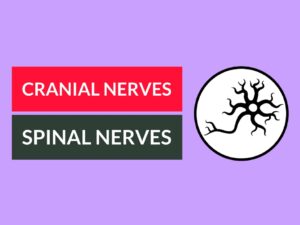Difference between Sensory and Motor Nerves
What is/are Sensory Nerves?
Sensory nerves are a type of nerve fibers that transmit sensory information from various parts of the body to the central nervous system (CNS). They are responsible for detecting and conveying sensations such as touch, temperature, pain, and proprioception.
Examples of Sensory Nerves
- Optic nerve
- Auditory nerve
- Olfactory nerve
- Trigeminal nerve
- Sciatic nerve
Uses of Sensory Nerves
Sensory nerves play a crucial role in our daily lives. They allow us to experience and interpret the world around us by transmitting sensory information to the brain. Without sensory nerves, we would lack the ability to feel pain, touch, temperature changes, and have an impaired sense of balance.
What is/are Motor Nerves?
Motor nerves, also known as efferent nerves, are responsible for transmitting signals from the CNS to the muscles and glands of the body. They control voluntary and involuntary movements and help regulate bodily functions.
Examples of Motor Nerves
- Facial nerve
- Phrenic nerve
- Sciatic nerve
- Brachial plexus
- Spinal nerves
Uses of Motor Nerves
Motor nerves enable our body to perform various voluntary and involuntary actions. They are responsible for controlling muscle contractions, allowing us to move our limbs, speak, blink, and perform other bodily functions. Additionally, motor nerves also regulate autonomic functions such as breathing, digestion, and heart rate.
Differences between Sensory and Motor Nerves
| Difference Area | Sensory Nerves | Motor Nerves |
|---|---|---|
| Sensitivity | Sensory nerves are sensitive to external stimuli, such as touch and temperature. | Motor nerves control muscle movements and are less sensitive to external stimuli. |
| Direction of Signal | Sensory nerves transmit signals from the body to the CNS. | Motor nerves transmit signals from the CNS to the muscles and glands. |
| Voluntary vs Involuntary | Sensory nerves are primarily involved in conscious sensations and voluntary actions. | Motor nerves control both voluntary and involuntary movements. |
| Function | Function involve sensing and detecting stimuli from the environment or within the body. | Function involves transmitting signals to initiate muscular contractions or glandular secretions. |
| Location | Sensory nerves are spread throughout the body. | Motor nerves extend from the CNS to specific muscles or glands. |
| Response to Stimuli | Sensory nerves respond to various external and internal stimuli. | Motor nerves respond by initiating muscle contractions or glandular secretions. |
| Effector Organ | Sensory nerves do not directly control any effector organ. | Motor nerves directly control muscles and glands. |
| Neuron Type | Sensory nerves include afferent neurons. | Motor nerves include efferent neurons. |
| Response Time | Sensory nerve responses are generally faster. | Motor nerve responses are comparatively slower. |
| Impairments | Impairments in sensory nerves can lead to loss of sensation or abnormal sensations. | Impairments in motor nerves can result in muscle weakness, paralysis, or lack of coordination. |
Conclusion
In summary, sensory and motor nerves have distinct roles and functions within the nervous system. Sensory nerves transmit sensory information from the body to the CNS, enabling us to perceive and interpret the environment. Motor nerves, on the other hand, carry signals from the CNS to muscles and glands, controlling voluntary and involuntary movements. Understanding the differences between these two types of nerves is crucial for comprehending the complexity of the nervous system and its impact on our daily lives.
People Also Ask:
- Q: What happens if sensory nerves are damaged?
- Q: How do motor nerves work?
- Q: Can sensory nerves repair themselves?
- Q: Are sensory nerves myelinated or unmyelinated?
- Q: How do sensory and motor nerves work together?
If sensory nerves are damaged, it can result in a loss of sensation or abnormal sensations, such as tingling or numbness, in the affected area.
Motor nerves work by transmitting signals from the central nervous system to the muscles and glands, enabling voluntary and involuntary movements.
Although sensory nerves have the ability to regenerate to some extent, the regeneration process is often slower and less efficient than in motor nerves.
Sensory nerves can be either myelinated or unmyelinated, depending on their location and function in the body.
Sensory and motor nerves work together to allow us to perceive the environment, process sensory information, and respond with appropriate muscle movements or glandular secretions.


